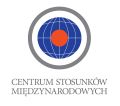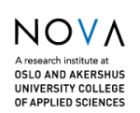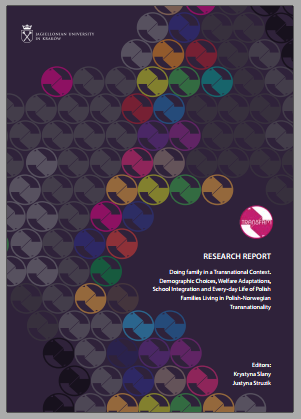Liderka w zadaniu 6
Katarzyna Gmaj
PhD in sociology (Warsaw University)
Currently, she works at Lazarski University, in Warsaw. Since 2001 she has been collaborating with various NGOs, including the Institute of Public Affairs and the Centre for International Relations as a researcher. Her main interests include migration, ethnic and national minorities. Ms. Gmaj worked on research projects within the sixth framework programmes of the European Commission and the European Fund for the Integration of Third Country Nationals.
Participation in EU Grants - most recent projects:
2012-2014 - Diversity in Political Parties' Programmes, Organisation and Representation, Polish partner ,researcher, European Fund for the Integration of Third Country Nationals. In Poland project carried out by the Lazarski University.
2012-2013 – Integration of refugee children and minors under international protection into Polish schools,researcher , European Refugee Fund. Project carried out by the Center for International Relations.
2011-2012 – Integration of non-EU women, wives of Polish citizens (Cudzoziemscy małżonkowie obywateli polskich – wymiar genderowy) , researcher, European Fund for the Integration of Third Country Nationals. Project carried out by the Center for International Relations.
2011-2012 A hurdle race - barriers to integration (Bieg przez płotki. Bariery na drodze do integracji) , European Fund for the Integration of Third Country Nationals. Project carried out by the Helsinki Foundation for Human Rights, researcher.
2009 –2011 METOIKOS ‘Circular Migration Patterns in Southern and Central Europe: Challenges and Opportunities for Migrants and Policy Makers', EC DG JFS – , Polish partner - in Poland Project carried out by the Center for International Relations.
2007-2009 CLANDESTINO ‘Undocumented Migration: Counting the Uncountable. Data and Trends across Europe', 6 thFramework Programme – Polish partner. – in Poland Project carried out by the Center for International Relations.
2006-2009 EMILIE ‘ A European Approach to Multicultural Citizenship: Legal, political and educational challenges', 6 thFramework Programme – Polish partner – in Poland Project carried out by the Center for International Relations.
Results of these projects
Participation in projects resulted in national and international conferences and seminars for academics and practitioners (NGOs' representatives, policymakers, officers etc…), policy briefs. It also resulted in following publications:
Most recent publications
K.Gmaj (with K.Iglicka and B.Walczak) 2013, Dzieci uchodźcze w polskiej szkole. Wyzwania systemu edukacji dla integracji i rynku pracy. [Refugee children in Polish school. Educational challenges for integration and labour market], Scholar, Warszawa p.115
K. Gmaj (with K. Iglicka) 2013, Circular Migration Patterns between Ukraine and Poland , in: Triandafyllidou, A. (ed) Circular Migration between Europe and its Neighbourhood. Choice or Necessity? Oxford: OUP,pp.166-187
K. Gmaj (with Iglicka, K and I. Bąbiak), 2012, Integracja imigrantek - żon polskich obywateli. Wyniki badań i rekomendacje[Integration of women, wives of Polish citizens] , Scholar, Warszawa, p. 105
K. Gmaj (with I. Babiak), 2012, Migranci „rodzinni" [Migrants driven by family reasons], in: A. Mikulska and H.Patzer (eds), "Bieg przez płotki – bariery na drodze do integracji", pp.80-108
K. Gmaj (with Iglicka, K and T. Maroukis), 2011, ‘Irregular migration and informal economy in Southern and Central-Eastern Europe: breaking the vicious cycle?', International Migration vol. 49 (5), pp.129-156.
K. Gmaj, Immigrant Pupils: Realities and Challenges for Polish Schools, in: Ziółek-Skrzypczak M. and Gandenberger G. (eds), "Labour Market Integration of Immigrant Youth. Polish and German Perspectives", Internationales ForumBurg Liebenzell and Centrum Stosunków Międzynarodowych
K. Gmaj (with K. Iglicka), 2010, Poland: ‘Waiting For' Irregular Migration', in: A. Triandafyllidou (red.), Irregular Migration in Europe. Myths and Realities, Ashgate, Aldershot, pp. 201-227.
Web-survey documentation
TRANSFAM Web-survey on Polish families living in Polish-Norwegian transnationality.






